The Ultimate Guide to Starting Your Food Truck
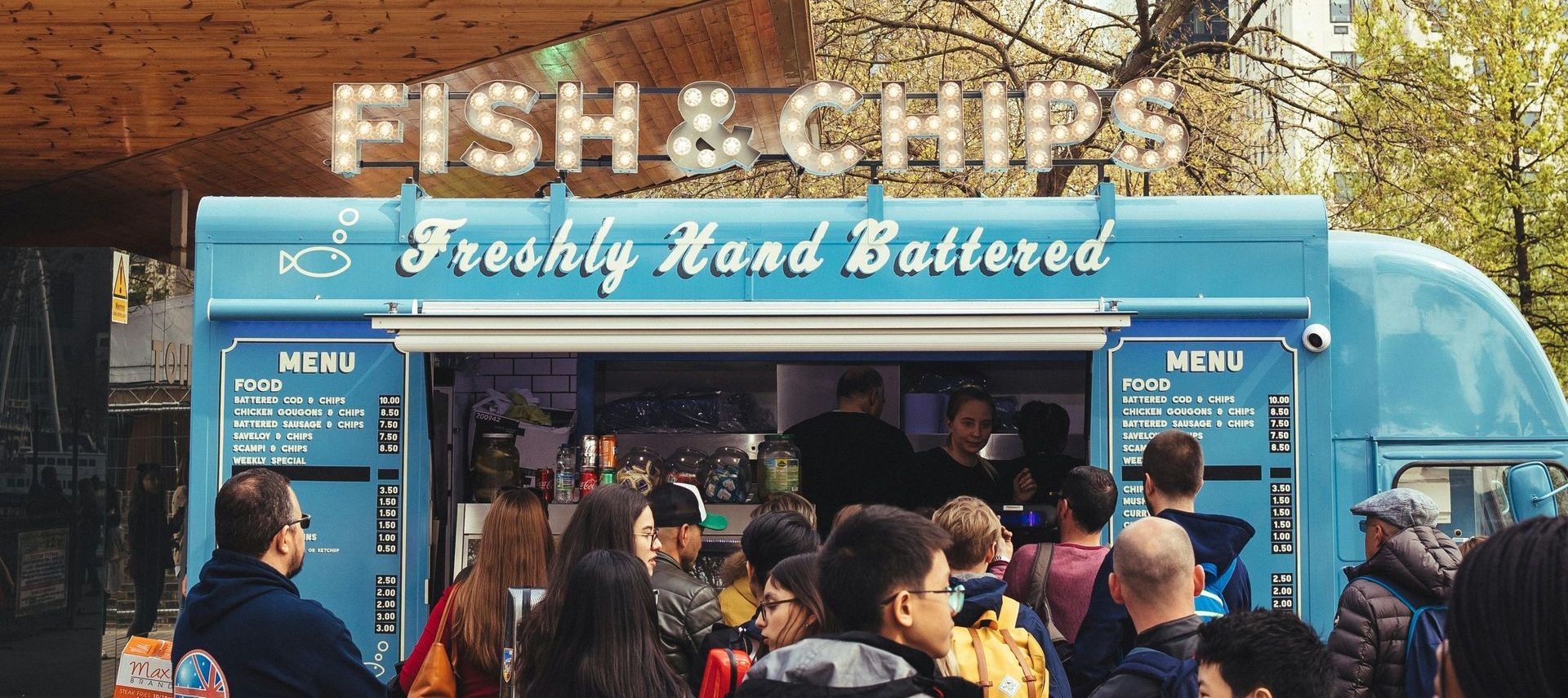
Getting Started in the mobile food business is a challenge to say the least, this guide is our humble attempt at helping others find their way into this amazing, yet exceedingly chaotic at times, industry.
Thinking about starting a food truck but don’t know where to start? Look no further, this is a comprehensive guide on what decisions you’ll need to make in order to start your own mobile food unit (the legal definition of a food truck) regardless of where you live. Our team started our first truck in early 2024 and have two more in the works, so hopefully you’ll be able to learn from our experience, and our mistakes along the way.
What we'll cover:
The Who, What, Why and Where
The Rules of the Road (operating legally)
What Makes a Good Menu
The Power to Sell (powering your food truck)
Setting up Your Food Truck
Incorporating Your Food Truck
Insuring Your Food Truck
Finding Parking and Negotiating Terms
Marketing and Customer Loyalty

The Who, When, Where, and Why
Who:
The who is probably obvious, it's YOU, so you’ve got that covered. But figuring out your why may be harder than you realize. Before I founded our company I was at TripAdvisor and worked with thousands of restaurants big and small, every owner without fail fell into one of three broad categories. Figuring out which one you fall into is paramount to your success.
The Chef - you love cooking, you're the type of person that comes into the office with leftover baked goods to share because you got carried away the night before. You enjoy the heat of the kitchen and do your best work under extreme pressure, because at the end of the day you love nothing more than sharing your creations.
The Manager - Maybe you've had a fairly successful career and know a thing or two about managing people and using excel spreadsheets to milk every penny out of a business. The food is nice but without brand building and good management any business is bound to fail, at the end of the day you are in the business of making money just like everyone else.
The Kid - Commonly inherited the business from a parent, or knows very little about the business. Not much in the way of cooking skills or the years of experience to understand proper management techniques and principles. They are normally the black horse because they are willing to work their tails off to learn everything as quickly as possible which, unsurprisingly, can lead to burn out if they aren’t careful. However, when they apply themselves correctly they generally shock their community and take the business to new heights finding a unique balance between the chef and manager roles.
Why:
Understanding where you generally fall in the above categories will help you better understand your strengths and weaknesses as you go about the start-up process and more importantly your personal why. I fall into the manager category while our team member who handles the day to day for our truck is a chef, who not too long ago would easily have considered herself The Kid.
Don’t get me wrong I’m a huge foodie but serving up hundreds of orders in just a few hours while toiling over a hot grill, just isn’t my thing. But for her? She loves the rush of running around serving up hot food and seeing the immediate gratification and satisfaction as people take their fist bite and go, “WOW”!
Pro tip: if you’re starting with a partner figuring out which of these categories you broadly fall into will help guide the division of labor for the rest of your start-up tasks and who gets final say over certain items. (I’m still waiting for her to add The Holiday in Cambodia Crepe but it’s her kitchen and menu)
When:
So by now you should hopefully have a better understanding of the who and the why so let's move on to the when.
Exit strategy: When will you close up shop permanently. I was on contract at a newly IPO’d company in New Zealand when I was first presented this question, and it baffled me.
I asked one of the founders what he thought made the company such a huge success in less than five years and his answer was, “we knew who we were, and we knew we would be done in less than a decade. But some companies struggle with important strategic decisions because they haven't decided where the finish line is.”
So what are your choices for exit strategy with a food truck? It’s not like food trucks exactly get listed on the NASDAQ. Well there are several options to carefully consider.
The Upgrade - It will come as no surprise that many food trucks are looking to expand to a physical location, sometimes while it isn’t the end of the business it does signify the end of the truck.
The Lifestyle Business - We have some local friends that earn enough to cover their living expenses, max out their retirement, and put some money into liquid investments off of their truck. As a result they’re happy to coast and never feel especially pressured to do certain events especially if they have no previous experience with the event organizers.
The Growth Business - Food trucks can be growth businesses, a local woman started one truck and has grown to eight different trucks serving three states here in the South East with two more on the way serving the food truck triangle (FL, GA, AL).
Where:
The initial where is three fold, where will you prep, where will you park, and where will you serve.
Where will you serve: This is easily the most important question, because the truck or trailer you choose will likely be a decision you can’t change for years. Are you going to choose a food truck or a food trailer? How much space will you need? Are you buying pre-built? Custom Built? How much room do you need to anticipate growth as you become known in the community? How much power will you need?
Pro-Tip: We decided on a trailer over a truck for several reasons. The first is the most common reason for choosing a trailer and why they are becoming more popular in some areas. If my truck breaks down we can rent one and still do business, but if a food truck breaks down you can’t serve anyone until it's fixed. The second reason may not be as obvious, a trailer provides significantly larger roof surface area which is great for solar panels, which if you aren’t doing anything too intense can run your rig without a noisy generator or gas fumes (especially important for our concept). Not to mention solar once installed for us will reduce our gas expenditure and maintenance costs by almost $6,000 annually.
Where will you prep: in short a commissary, cottage laws are increasingly becoming restrictive and most state health agencies require the use of a commissary for all mobile units. How much you’ll pay depends on location and services offered. Some states require commissaries to have separate kitchens for each business renting space, which sounds insane, but does offer some tangible benefits to you as the business owner. For example if you have the funds you can start online ordering right away, which helps build credibility and provides options for customer retention not available to those of us who are not required to follow those rules. If you’re in a place like California expect to pay dearly for one hour of kitchen time a week and a storage shelf with access to a water hook up and gray water disposal.
Pro-tip: If you're struggling to find a commissary we have built a national network of commissary partners we would be happy to refer you to. Just contact us on our contact page or shoot us an email at info@glitchlocal.com.
Where will you park: This is highly dependent on your location, how far you’re willing to travel, your menu and pricing. Keep in mind that some hospitality groups have gained ground in recent years lobbying to ban food trucks from being too close to any established restaurants, so check your local laws before signing any agreements. We'll talk more in depth about these later.
The Rules of the Road
Since this Guide would be too long if we included the regulatory guidelines and specifics for every state we’ve written separate articles for each with links to all of the pertinent sites and information. Select the state, or states, you intend to operate in below to see more about their specific regulations for mobile food units.
Alabama Alaska Arizona Arkansas California Colorado Connecticut Delaware Florida Georgia Hawaii Idaho Illinois Indiana Iowa Kansas Kentucky Louisiana Maine Maryland Massachusetts Michigan Minnesota Mississippi Missouri Montana Nebraska Nevada New Hampshire New Jersey New Mexico New York North Carolina North Dakota Ohio Oklahoma Oregon Pennsylvania Rhode Island
South Carolina South Dakota Tennessee Texas Utah Vermont Virginia Washington West Virginia Wisconsin Wyoming
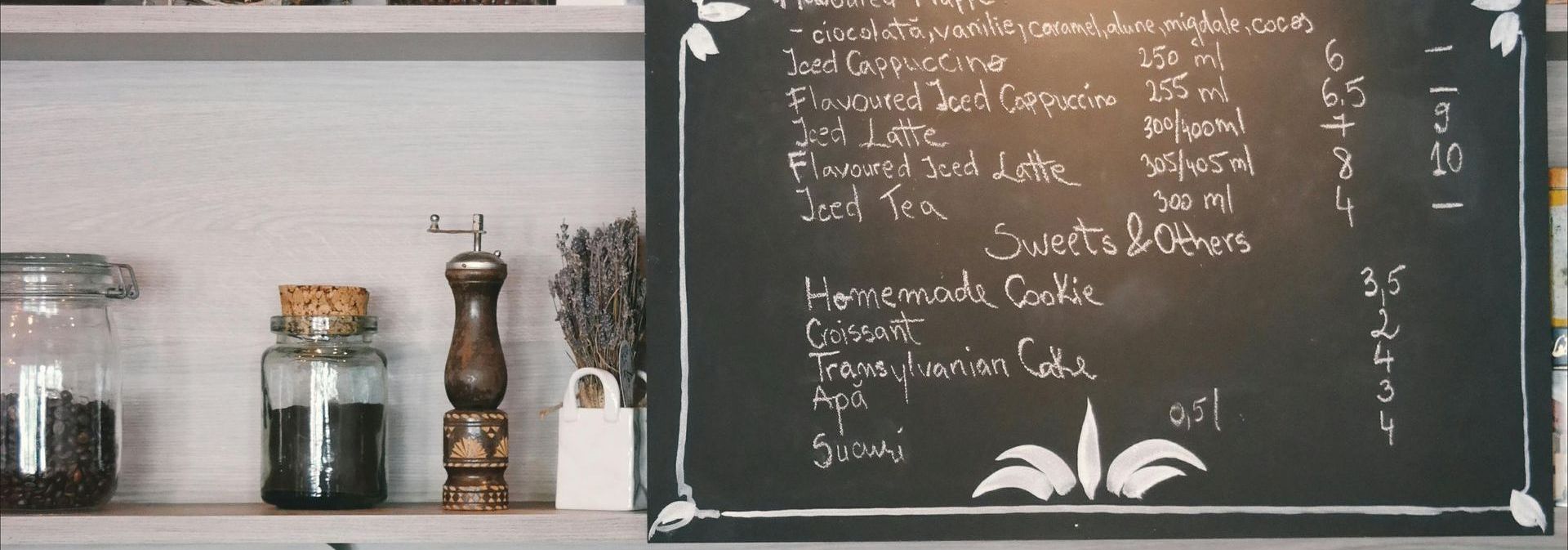
What Makes a Good Menu
Odds are you already have an idea what your concept will be, and a rough idea of the menu you’d like to make. But as you think about your menu I’d like to point out a few keys to making it work in your favor.
Space on your food truck or trailer will be one of your largest limitations outside of power. Making sure you have plenty of overlap with ingredients means you’ll be less likely to run out of food during events. While selling out might feel good the first few times, if you sell out too early all you’re doing is leaving money on the table.
Pricing your menu for a food truck can also be a challenge. Like with any food and beverage business you’ll need to fully understand your food costs in order to price your items but also understand that wherever you park will require either a flat rate for some events or if you're parking up at a shop they will require a percentage of sales. A percentage is easy enough to program into your Point of Sale, it’s just put in as an added tax. However, some customers may be upset by the higher than anticipated costs so you can opt to increase your prices effectively baking in the parking fee instead of adding it on.
Pro Tip: Food costs are calculated by adding up all of your ingredients used per serving. Depending on how large and complex your menu is this can be painful to do. One of the best ways to make it simpler since you will need to re-evaluate the prices you’re buying ingredients at every month, is to limit the ingredients used, saving valuable refrigerator space and time.
The Power to Sell
Let me start off this section by saying I am in no way a qualified electrician. Which might explain why I personally struggled with this so much when setting up our trailer.
Calculating Wattage: If you know what your concept and menu is going to be now is the time to create an equipment wish list. I split my list into three categories:
Must haves: Without these we wouldn’t be able to sell anything.
Wants: Not needed to open up but we will need them sooner rather than later.
Future planning: Basically duplicates or replacements of other equipment that will allow us to increase our rate of sales.
By each item write down the running watts and add them up.
If you’ve already bought your truck or trailer there should be a breaker box inside. If you haven’t yet made your purchase then take your list with you when shopping. Add up the amperage in the box and multiply by the voltage (110 in the U.S., 220 elsewhere) This is the total watts you can run. This also means you should find a generator that can provide more running watts than that number.
Pro-tip: Generators are expensive… like really expensive. If you’re just starting out, buying a generator that can cover your must-have appliances and half of your wanted appliances should be enough so long as your system can push that many watts. Ie: Our trailer can push 15k watts. We need 3600 watts, all of our wants require 12k watts. We have a generator that runs 7600 watts (predator 9500 inverter). In other words, growth is expected but we likely won't grow fast enough for it to be an issue before the generator dies or is replaced. (your numbers may look different because we run very low wattage appliances by design)
Setting Up Your Food Truck
Everyone has a wildly different perspective on how to set up your workflow when first starting out, which makes a lot of sense when you consider we all sell different products, the needs of a donut truck won't be the same as a BBQ truck. That being said there are a few ways you can optimize your workflow right out the gate.
No employees, fewer problems: Employees can be a god send especially if you run an event only truck, they will be unavoidable to serve customers in a timely manner. If you are not an event only truck try to limit your employee overhead as much as possible especially early on. We launched with 1 full time employee (our operator), and members of our team at Glitch Local tag in when things get busy. Eventually we will obviously need at least one more employee for All In The Crepe, but in the beginning running as lean as possible saves money and helps you spot inefficiencies.
Write SOPs for cleaning the floor: SOPs (Standard Operating Procedures) should be written down in excruciating detail and made available to your entire team in a binder or an app like notion. This is something I've seen countless businesses, not just food trucks, ignore, and it always causes problems. Write everything down, how to make your menu, how to present your menu, how to handle transactions, and yes even how to clean the floor when you get back to the commissary.
Build in redundancy: This can take many shapes but one redundancy every food truck should have but is rarely talked about is their POS (Point of Sale) software. Not even the most successful trucks in the nation have the clout to fight some common practices in the POS industry, so build in redundancy by having access to multiple. Here's a real life example:
Mimi's food truck (named changed for obvious reasons) uses square POS, she goes to a high school event that is supposed to last 4 hours and promises to be a money maker. About an hour into the event she sees a notice on her POS that she can still accept payments but they will be held until a chargeback is resolved. One of the first students she served swiped their card and immediately filed a chargeback. Seeing this notice Mimi closes square and brings out another POS guaranteeing she receives the last 3 hours of sales in her bank account the next day avoiding having to wait to get paid the full amount.
Depending on your concept you'll also want to build in redundancy for concept critical equipment. For example, We have a spare mixer on board in case we notice crepe batter is running a bit low we can make a small amount at a time to keep us from closing. We also have a spare cook top (something that's much harder to do if you're making pizzas) and other necessary tools to prevent us being caught with our pants down.
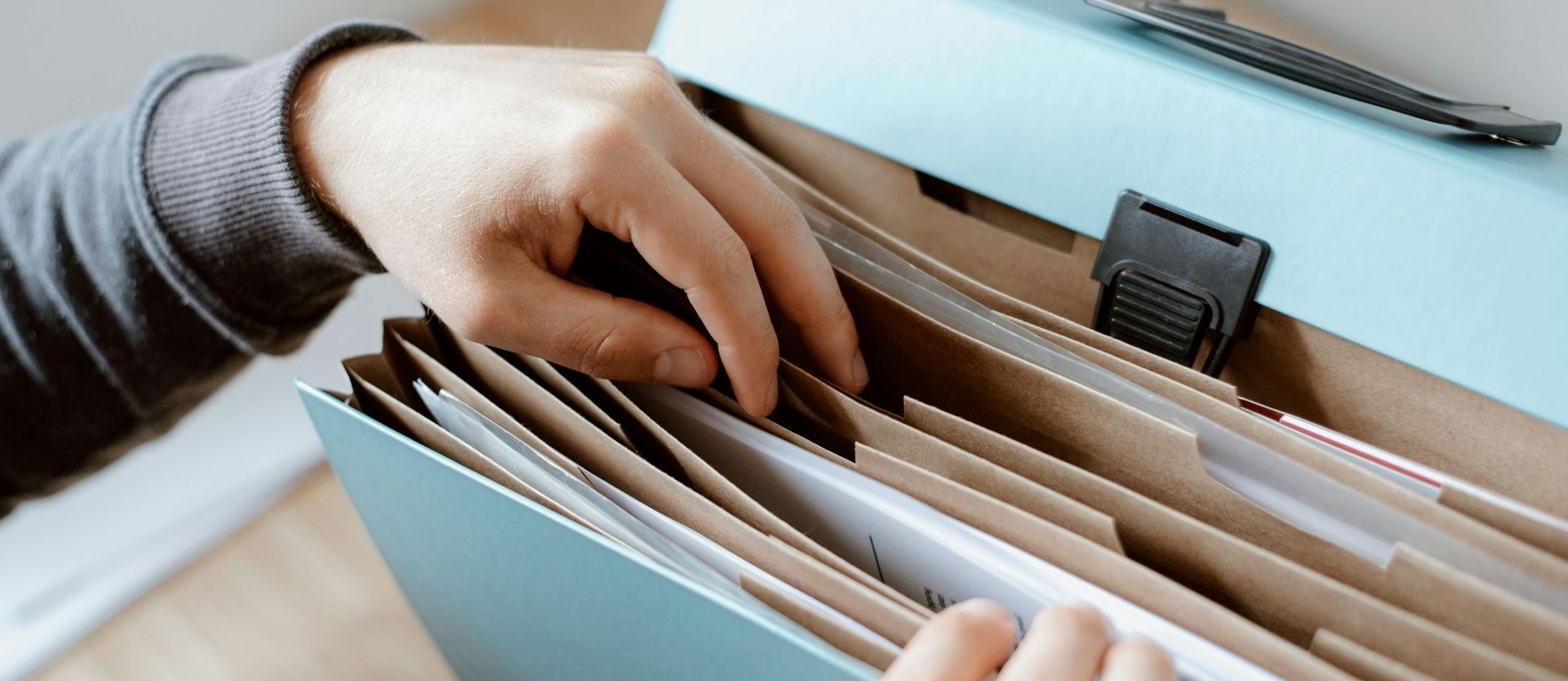
Incorporating Your Food Truck
A boring but necessary process. You can find the correct paperwork for incorporating on your states Secretary of State website which is linked in every state's specific start up article, you can find your state linked under "The Rules of the Game". But in order to incorporate effectively you need an idea of what to incorporate as and why. Here we'll discuss the differences between each structure and then explain how to choose the one that's right for you.
Sole Proprietorship:
This is the simplest structure, often chosen by small food truck operators just starting. As a sole proprietor, you and your business are legally the same entity, meaning you’re personally responsible for all debts and liabilities. It’s easy to set up and has minimal paperwork, but the lack of liability protection can be a significant risk.
Pro-tip: a sole proprietorship is fine to start unless otherwise banned by your commissary or vendors, but do yourself a favor and incorporate properly by the end of your first year.
Partnership:
If you’re starting your food truck with a partner, a partnership might be a good fit. This structure divides the business's responsibilities and profits between two or more individuals. Partnerships can be simple to establish, but similar to a sole proprietorship, they do not provide personal liability protection.
Limited Liability Company (LLC):
An LLC offers a balance between simplicity and liability protection, making it a popular choice for food truck businesses. LLCs protect your personal assets in case of business debts or lawsuits.
Corporation (C-Corp or S-Corp):
If you’re planning significant growth or seeking outside investors, a corporation might be your best choice. Corporations provide the highest level of liability protection and allow for stock issuance. However, they come with more regulatory requirements, higher costs, and complex tax implications. For most filing for a C-Corp would equate to killing a fly with a cannon. An S-Corp (a subset of a C-Corp) however, may offer tax advantages for small business owners with established assets by avoiding double taxation, but it has strict eligibility requirements.
To decide which structure suits your needs:
Evaluate Your Risks: Consider the potential liabilities of your business, such as accidents or food safety issues, and determine how much personal protection you require.
Consider Tax Implications: Different structures offer varying tax benefits. Consult with an accountant to assess how each option aligns with your financial goals.
Assess Your Long-Term Plans: If you aim to grow your food truck into a larger operation with employees or additional trucks, you might benefit from the structure and scalability of an LLC or corporation.
Factor in Complexity: Some structures, like corporations, require more paperwork and ongoing compliance. Ensure you have the time and resources to manage these requirements.
Incorporation services: Some of you may be surprised to learn we do not dissuade anyone from seeking the help of an established registered agent and incorporation service. That being said, if you're going that route do your research on them and make sure you are getting a good deal. At Legal Zoom for example you will often pay 4x more than other providers. We do recommend hiring an attorney to do this for you instead of one of these services, however we understand you may be on a tight schedule or be unfamiliar with trustworthy lawyers in your area.
Insuring Your Investment
Properly insuring your food truck or trailer is one of the most critical steps to protect your business. A well-structured insurance policy safeguards your investment, covers potential liabilities, and ensures compliance with local laws and event requirements. Here’s a guide to getting the right coverage for your food truck or trailer.
Understand the Types of Insurance You Need
Food trucks and trailers have unique risks, requiring specific types of coverage. Here’s a breakdown of the essential policies every mobile unit should have eventually even if not required to start-up:
a. General Liability Insurance
This is the cornerstone of any food truck insurance policy. General liability protects you from third-party claims for bodily injury or property damage. For example, if a customer slips near your truck or your trailer accidentally damages property, this coverage kicks in.
b. Commercial Auto Insurance
For mobile food trucks, this policy covers damages to your vehicle caused by accidents, theft, or vandalism. It’s distinct from personal auto insurance and tailored for business use.
Food Trailers: If you operate a trailer, your towing vehicle’s commercial auto insurance typically covers it while it’s in transit. However, you’ll still need separate policies for liability and business property.
c. Business Property Insurance
Your truck or trailer is filled with expensive equipment—grills, refrigerators, POS systems, etc. Business property insurance covers these assets against risks like fire, theft, or vandalism.
d. Product Liability Insurance
As a food business, product liability is critical. If a customer falls ill from consuming your food or experiences an allergic reaction, this policy protects you from lawsuits related to foodborne illnesses.
e. Workers’ Compensation Insurance
If you have employees, many states require workers’ compensation insurance. It covers medical expenses, lost wages, and other costs if an employee gets injured on the job.
f. Business Interruption Insurance
Unexpected events—such as a fire, severe weather, or equipment failure—can halt your operations. Business interruption insurance covers lost income during these periods, ensuring you can bounce back.
g. Event-Specific Insurance
Many food truck operators attend festivals, markets, and private events. Some organizers require additional event-specific insurance or proof of liability coverage. Be sure to confirm these requirements ahead of time.
Assess Your Risks and Coverage Needs
Every food truck or trailer business is unique, so your insurance should be tailored to your specific risks. Ask yourself:
What is the value of my truck or trailer?
Ensure your property insurance reflects the cost to repair or replace your vehicle and equipment.
Do I operate in high-traffic areas or extreme weather conditions?
These factors may increase the likelihood of accidents or damages, requiring more comprehensive coverage.
Do I serve alcohol or cater private events?
Special coverage, such as liquor liability insurance, may be necessary.
Am I hiring employees or contractors?
Workers’ compensation or employer liability insurance may be required.
Budget for Insurance Costs
Insurance is an essential business expense, and budgeting for it can help you avoid surprises. On average, food truck operators spend between $2,000 and $5,000 annually on insurance, though costs vary based on location, coverage limits, and the size of your operation.
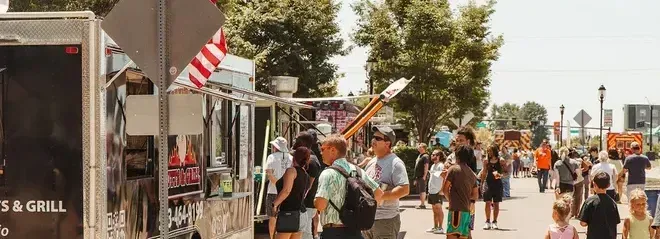
Finding Parking & Negotiating Terms
Securing a prime parking spot is a critical challenge for any new food truck owner. Beyond the obvious choices like busy streets or public event spaces, thinking creatively can help you stand out and establish a loyal customer base.
- Partner with Local Businesses: Approach breweries, coffee shops, or office buildings to set up shop in their parking lots. These partnerships often provide built-in foot traffic and a steady customer base.
- Explore Underutilized Spaces: Reach out to schools, libraries, or community centers like churches, about parking during their off-hours.
- Join Pop-Up Markets: Look for opportunities at farmers' markets, festivals, and food truck rallies to get your footing. Although just a warning rallies rarely provide a profit to trucks, they so provide a way to market yourself and network with other trucks though.
Typical Terms for Food Truck Parking
When you secure a parking spot, the agreement will typically include:
- Fees: Monthly or daily rental rates vary based on location. High-traffic spots can cost anywhere from $100 to $1,000+ per month.
- Revenue Sharing: Some property owners may request a percentage of your daily sales, often ranging from 5% to 15%. If you live in a University town and have to deal with Aramark this can be as high as 30%.
- Utilities: Determine whether you’ll have access to electricity, water, or waste disposal, and clarify if there are extra fees. Depending on your state this is irrelevant as you legally need to be self-sufficient.
- Exclusivity: Some agreements may grant you exclusive rights to serve food on the property, ensuring no direct competition.
- Operating Hours: Most agreements specify the hours you’re allowed to operate. Ensure these align with your peak service times.
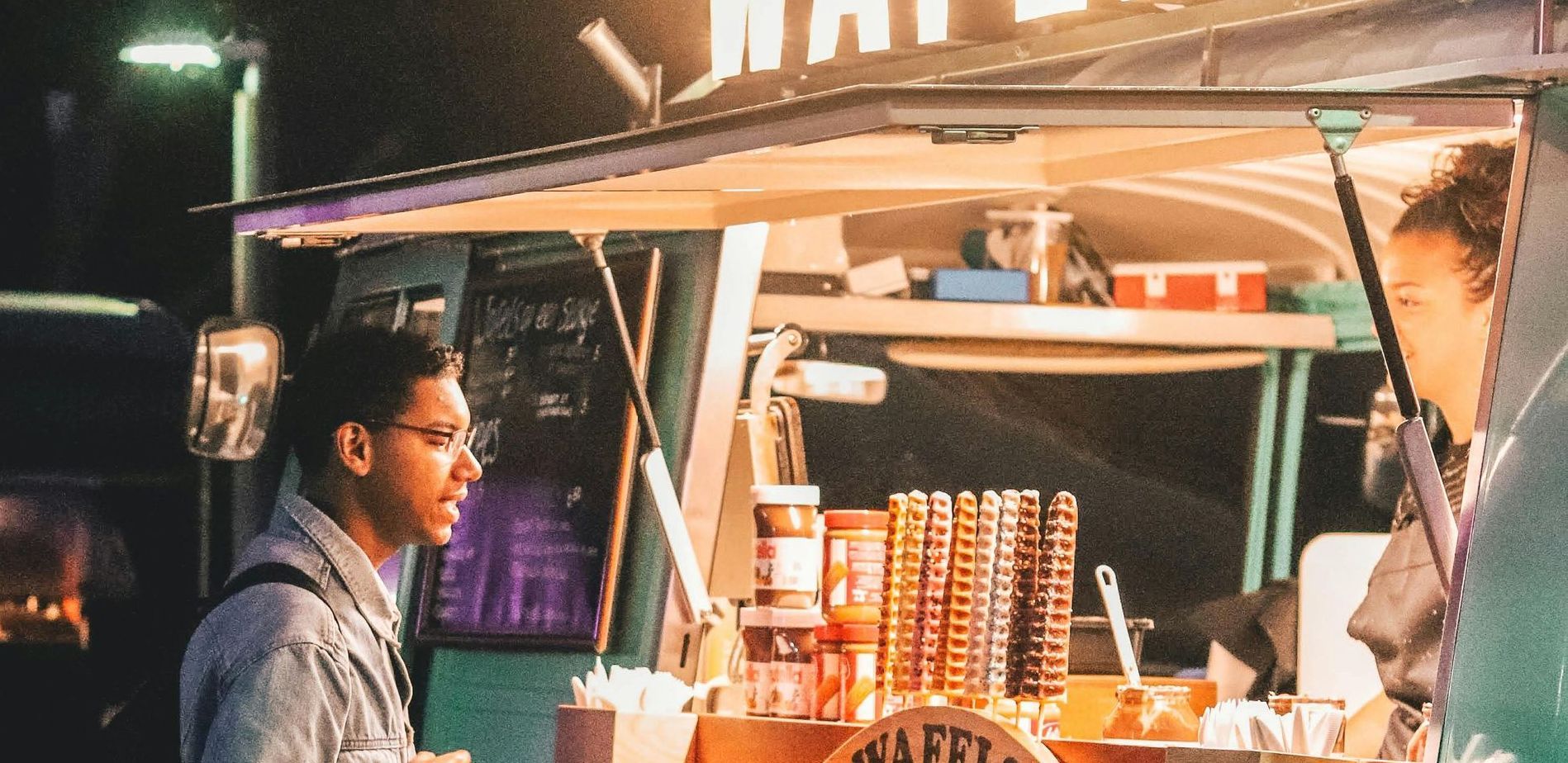
Marketing & Customer Loyalty
Finally I can get to something I have a natural talent for. And if you're rolling your eyes right now and saying "I bet he's going to pitch his services". You would be correct because my dyslexic brain just sat down a wrote this entire thing, but I will mention several things we do not offer here at Glitch Local as well so it's worth reading till the end.
Branding:
Building your brand as a start-up food truck can be more difficult than some people realize. Generally your brand needs to convey, quality, pricing, and speed. Our branding for All In The Crepe, while not perfect is designed around local themes and colors made to convey a longer wait time and higher quality at a mid range price. And to be frank, we won't ever be done building the brand, we did however build a brand kit prior to launching and recommend you do the same.
What's a brand kit?
A brand kit is something a designer makes for you, it breaks down your color scheme and how frequently certain colors should be used. It also normally lays out the font you will be using in all of your marketing materials and generally comes with a logo that has several variations for different uses.
Building your online presence:
Hey I told you I was going to do it. But in all seriousness for a mobile business there is nothing more important than your online presence. It's how you make a living, land that next big event, and present yourself to the world. A website is a key component of that.
Why go with a glitch local website?
It's affordable with no upsells to get started on the right footing. "But this website builder over here is cheaper than you" I hear you say. Yes, and according to certain cheap website builders 86% of users don't publish a website within 90 days of signing up. That also contributes to why their support tends to be lackluster or automated.
However, with us you get a site designed for mobile food units, that has been tested by more than 100 clients, and a dedicated account manager who gets to know you and your business on a personal level. The best part? Because our consultants are all salaried, there is no incentive for them to sell you things you don't need or keep products active that don't provide an ROI for your business.
Moreover we only put our brand on websites that we are shareholders in, meaning you get a seamless online experience designed with best practices for mobile units in mind, under your brand with, let me be blunt, world class support in a world leaning too much on artificial intelligence.
Something tells me the cheap website builder isn't giving you that tailored experience starting at $50 a month.
Paid Advertising:
Most trucks skip pay per click (PPC) advertising altogether and for good reason, we're mobile. But there are some things to consider here.
Every Door Direct Mail (EDDM):
This is a service some events like October fests, state fairs and the like will use to sell tickets. It's not too expensive and basically it allows you to send prepaid flyers to everyone living in a specific area with even more targeting options available. If you're stationary part of the time this could be a good way to promote your business. If you primarily do events and are looking to do paid advertising seeing if some of these event managers would be willing to add you logo, a picture of your truck etc. on their campaign for a fee will help build brand recognition for you and lower their cost.
Influencer Marketing:
There is no good way to currently handle influencer marketing in my opinion and trust me I've looked. No matter what you do you're taking a huge risk and it doesn't help that some of them act like complete thugs about it. Honestly I would avoid it unless they have a company like a local food blog, a local celebrity like a college football coach. But again this will cost a lot of money and results are far from guaranteed and could end up hurting your brand in the long run if you're not careful.
Social Media Best Practices:
It will come as no surprise to learn food trucks rely heavily on social media. If you didn't know traditional listing sites like Google, Yelp, Bing, Yahoo, Yellow Pages, TripAdvisor etc. all suppress food truck listings. How do I know this, I've worked with all of them and for one of them in particular. This makes your Facebook page (which is classified as a listing), one of the most important parts of your marketing strategy.
Facebook:
Try to post high quality content (not just memes) 2-3 times per week minimum. Many trucks will post their upcoming schedule and where they will be on specifics days. You should do this for at least one of those posts. If you're going to an event thank you posts also do well ie "we had a blast serving everyone @event, thank you to everyone that came out". Don't be afraid to create and dip into a backlog, I'll talk more on this later.
Instagram:
Facebook I'm sorry "Meta", owns Instagram and the two work seamlessly for the most part. So it isn't surprising to see people cross posting given the demographic differences between platforms. Generationally boomers are on Facebook, Millennials and X prefer Instagram. Set up your business Instagram and make sure at a minimum if you're not going to create unique content for IG you schedule your posts to go to both platforms from your Facebook Page.
Reels:
It's not its own social media but deserves a mention here. Reels can go to both Facebook and Instagram, it's Meta's answer to TikTok, but without the golden algorithm (more on that below). If you're creating content for TikTok then posting the same content on reels is a no brainer. However, reels that focus on being informative do better than dances. Again, these platforms have fairly different demographics so get to know your ideal customer profile well.
TikTok:
I can hear some of you groaning through my keyboard already. Like it or not TikTok is jet fuel for food trucks. Why? because of the way content is distributed through their algorithm. To put it in it's simplest terms TikTok serves content to people online who are closes to you, the more interactions your content gets the further it goes. That is, I will admit, a very watered down version of how their algorithm works but if you've been paying attention so far you will immediately realize it's the only social media platform that actively works in your favor as a mobile food unit.
The general rule of thumb here is to create short (sub one minute) content that is informative, oddly satisfying, or quirky. And post it the moment you open up shop, every day. Odds are a "we're parked here today" video will not go as far as a video titled "I made a chocolate Pikachu". Bottom line given the fact you can re-use the content for reels across the meta platform using TikTok should be a no brainer.
Creating vs. Consuming:
If this is your first foray into creating social media content as a part of how you make a living it can be daunting to know where to start. You will quickly notice as most social media manager do, that social media loses its charm and addictive qualities. The reason for that is simple, the more experience you gain the further the curtain is pulled back and you see why social media basically acts as a drug. I've known many people to give up social media in their personal lives for good and only use it as an engine for creation and marketing, including myself.
With that being said the reality is that very few businesses can find success without using some form of social media marketing and building an online community. Be careful how you interact with people online and always represent your brand and the values it embodies. If push comes to shove as a small business owner don't hesitate to take a break from social media if you have to for a few days. One of the things that carries us through those times is how we set-up and structure our editorial calendar.
Editorial Calendar & Backlog:
an editorial calendar can be something as simple as google calendars with events for when you are going to post, what and, where. It may not seem like a necessary detail but assuming you stick to your calendar you will more easily be able to look back over time and begin A/B testing when the best times to post are for your community, what their most interested in hearing about from you etc.
Your backlog is content you've made that you can post at any point in time, I am currently building Glitch Locals backlog out and helping on AITC's. I'm a bit unhinged when it comes to the backlog because I aim to create about 12 months of content, however most people only leave about 1-2 months ready to go. In case your curious why I'm so aggressive about the backlog it's basically an insurance policy for small businesses should something happen to your primary community manager.
Building Customer loyalty:
This is easily the most important part of working in food and beverage that gets overlooked. Food service has a mathematical cap of how many customers you can serve at a time. It depends on how many tables you have or in our case how quickly you can get an order out the window. But acquiring new customers is expensive and time consuming, finding creative ways to retain customers will always be better than hunting for new ones.
Email Lists:
While there isn't any great software promoting customer loyalty for food trucks, especially event trucks. It is worth trying to build an email list that you can inform every month of where you are scheduled to be. Every week would also be alright but make it worth their time with a small discount. Make sure to Prune your list every 3-6 months so that your messages don't get automatically sent to spam.
Reviews:
We all know reviews help bring in new customers but responding in a timely manner to reviews in a polite and professional way actually helps retain customers too. As humans we are drawn to drama, just watch the news, they could easily make their reporting dry but they intentionally inject drama into any situation in order to get more engagement. How you react to negative reviews can be a breaking point for regular customers, never respond when you're angry.
Seasonal Menus:
Creating seasonal menus is a tried and true way of winning back old customers that may have lost interest in what you're selling. This doesn't need to be a whole menu rework simply a few items that you'll have stocked for a limited amount of time every season.
At the end of the day many food trucks and restaurants alike die out because they spend too much time and money getting people in the door and not enough on trying to get people to stay. There are other methods I will share later in full on academic style marketing research articles that we use for our truck but since I haven't gone through all of the data yet I won't add them here even though the initial results are promising.
Hey if you made it to the end, that probably means you're in this for the long haul. So I just wanted to end this with a bit of a welcome to the industry and some last minute advice. We have obviously built our careers on helping people just like you, but in mobile food, there are people all around you that are willing to lend a hand. From your commissary leadership, to fellow road warriors, welders, camping world for some inexplicable reason (seriously work with them if you have a trailer). But while your gearing up take a breath and enjoy the moment.
Congratulations on the new business and from our family of small businesses to yours we wish you the best!
See You On The Road, Scott

Categories
Podcast




